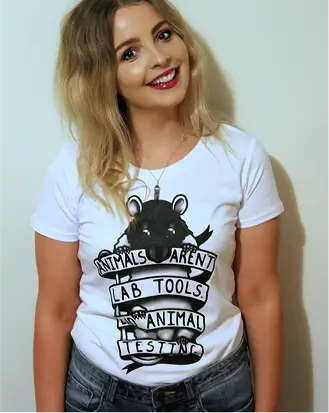How Animals Can Be Used
Many people are surprised to learn that animal experimentation is still legal in NZ. However, not just anyone can use animals in experiments!
Institutes or individuals wanting to use animals for science in New Zealand have to meet the following requirements:
1. Have a Code of Ethical Conduct that has been approved by the NZ Government.
This code sets out the policies and procedures that should be followed by the person or institute and its animal ethics committee. People or institutes can use another facility's approved Code of Ethical Conduct rather than setting up their own.
You can see an example of what a Code of Ethical Conduct looks like here.
2. Have an animal ethics committee or have an arrangement with another facility to use theirs. Animal ethics committees approve and monitor the use of animals for science.
3. Provide information about animals they use for science to the NZ Government each year. They must submit annual statistics on the number of animals used for research, testing and teaching to the Ministry for Primary Industries (MPI). These figures are collated and reported annually by MPI. You can access these here.
For the most part, it is left up to animal ethics committees to decide how animals can be used.
However, there are legal exceptions, including:
1. Only research, testing and teaching involving "animals", as defined by the Animal Welfare Act, requires approval from an animal ethics committee. Any living organism that falls outside that scope doesn't require animal ethics committee approval in NZ.
Fun fact: the definition of animal varies from country to country:
- In New Zealand, it includes any live member of the animal kingdom that is a mammal, bird, reptile, amphibian, fish (bony or cartilaginous), octopus, squid, crab, lobster or crayfish (including freshwater crayfish). It includes any marsupial pouch young or mammalian foetus, or any avian or reptilian pre-hatched young, that is in the last half of its period of gestation or development.
- In Australia, it includes any live non-human vertebrate (fish, amphibians, reptiles, birds and mammals, encompassing domestic animals, purpose-bred animals, livestock, and wildlife) and cephalopods but with some variation by state.
- In the US, it includes warm-blooded animals but excludes birds, rats and mice bred for use in research.
2. Only research, testing and teaching that involves the manipulation of animals, as defined by the Animal Welfare Act, requires approval from an animal ethics committee. Any procedure that falls outside that scope doesn't require animal ethics committee approval in NZ.
Manipulation means interfering with the normal physiological, behavioural, or anatomical integrity of an animal by deliberately subjecting them to an abnormal procedure like exposing them to a drug or chemical, or electrical stimulation, forcing them into activity or restraint or depriving the animal of usual care.
Manipulation also includes:
- Killing an animal for research, testing, or teaching for its body or tissues.
- Breeding animals with a greater risk of pain or distress (for example, to research hereditary medical conditions).
The full definition of ‘manipulation' can be found in section 3 of the Animal Welfare Act 1999.
The following uses of animals can be done freely (no animal ethics approval required):
- School, classroom or student pets, including pet days where appropriate animal care is given.
- Observations of behaviour (provided the presence of people does not interfere with normal behaviour, for example, animals giving birth are often affected by the presence of people).
- Observations of body structure and function.
- Measurement of growth, e.g., regular weighing to chart a growth curve.
- Identification of diet preferences and food “treats”.
- Observation of animal response to different cage equipment such as tubes, platforms, and ramps.
- Breeding to teach reproduction and development.
- Routine animal care and handling techniques, including routine farm husbandry practices.
The above list was sourced from the New Zealand Association of Science Educators.
How animals can't be used
In New Zealand it is illegal to:
1. Test cosmetics on animals: Thanks to the #BeCrueltyFree campaign that NZAVS was a part of, testing cosmetics on animals in NZ has been banned. You can read more about this victory here.
The Animal Welfare Act 1999 prohibits the use of animals for developing, making, or testing a cosmetic or developing, making, or testing an ingredient that is intended exclusively for use in a cosmetic in NZ.
However, this does not include:
- Using animals to test an ingredient that is used in cosmetics but is being used for another purpose.
- The sale and importation of cosmetics that have been tested on animals in NZ.
2. Test legal highs on animals: The Psychoactive Substances Act 2013 prohibits the consideration of data from animal tests (that have been conducted in NZ) for assessing the safety of psychoactive products.
Our campaign to ban testing psychoactive substances on animals, such as party pills, was a huge success. With the help of several other organisations, we persuaded the government to leave animal data out of testing for psychoactive substances – that means even experiments conducted overseas cannot be used for approval of New Zealand psychoactive substances. You can read more about this win here.
3. Test on gorillas, chimpanzees, bonobos, or orangutans: The Animal Welfare Act 1999 prohibits the use of gorillas, chimpanzees, bonobos, and orangutans (non-human hominids) unless approved by the Director-General.





